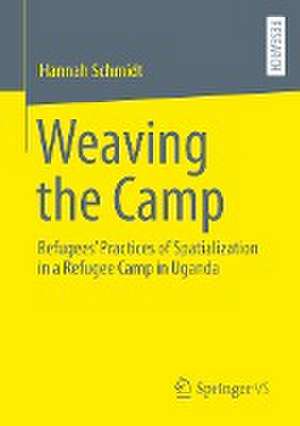Weaving the Camp: Refugees' Practices of Spatialization in a Refugee Camp in Uganda
Autor Hannah Schmidten Limba Engleză Paperback – 14 iul 2023
Preț: 583.13 lei
Preț vechi: 686.04 lei
-15% Nou
Puncte Express: 875
Preț estimativ în valută:
111.58€ • 116.80$ • 92.87£
111.58€ • 116.80$ • 92.87£
Carte tipărită la comandă
Livrare economică 31 martie-14 aprilie
Preluare comenzi: 021 569.72.76
Specificații
ISBN-13: 9783658416492
ISBN-10: 3658416491
Pagini: 278
Ilustrații: XIX, 278 p. 20 illus. Textbook for German language market.
Dimensiuni: 148 x 210 mm
Greutate: 0.4 kg
Ediția:1st ed. 2023
Editura: Springer Fachmedien Wiesbaden
Colecția Springer VS
Locul publicării:Wiesbaden, Germany
ISBN-10: 3658416491
Pagini: 278
Ilustrații: XIX, 278 p. 20 illus. Textbook for German language market.
Dimensiuni: 148 x 210 mm
Greutate: 0.4 kg
Ediția:1st ed. 2023
Editura: Springer Fachmedien Wiesbaden
Colecția Springer VS
Locul publicării:Wiesbaden, Germany
Cuprins
Introduction.- Theorizing Socio-Spatial Practices.- Research Design.- Humanitarian Patterns of the Camp: Order, Spacing and Protraction in Kyaka II.- Social Fabric: Refugees’ Social Practices of Spatialization in Kyaka II.- Material Fabric: Refugees’ Material Practices of Spatialization in Kyaka II.- Pulling the Strings: Refugees’ Rearranging Practices in Kyaka II.- Conclusion.
Notă biografică
About the author
Hannah Schmidt is a member of the Institute for Migration Research and Intercultural Studies (IMIS) at the University Osnabrück. Her research is on encampment and refugee regimes in the Global South, as well as social practices, agency and spatial production in the context of humanitarianism.
Textul de pe ultima copertă
This book offers a socio-spatial analysis of a refugee camp in southwestern Uganda. Based on qualitative research with a multi-method approach the author shows how refugees are central actors in the operation and becoming of a camp. Not only do they crucially contribute to its social, micro-economic, and material realization but they also incrementally rearrange the camp space by acts of constant adaptation in order to make it work for its inhabitants. By means of social interaction, infrastructuring, translation, movement and material improvisation they navigate daily life in the semi-constricted and highly precarious space of the refugee protection regime and carve out its social and material landscape. Thus, this study challenges static understandings of camps and restricted conditions and puts forward theoretical implications for the rethinking and reassessment of agency in such contexts by calling for closer attention to ordinary practices.
About the author
Hannah Schmidt is a member of the Institute for Migration Research and Intercultural Studies (IMIS) at the University Osnabrück. Her research is on encampment and refugee regimes in the Global South, as well as social practices, agency and spatial production in the context of humanitarianism.
